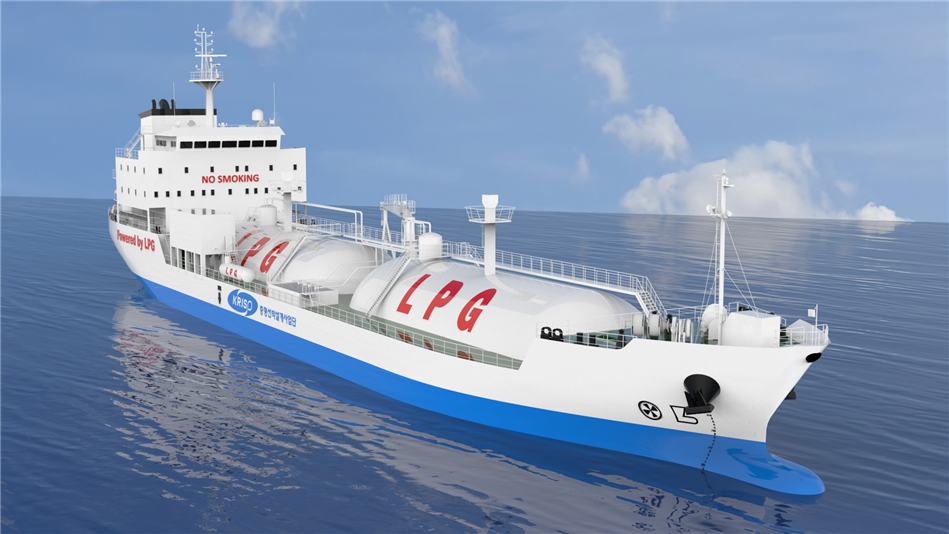
KRISO acquired AIP for LPG-fueled small-scale LPG carrier
□ On the 16th, the Korea Research Institute of Ships and Ocean Engineering (KRISO led by President Booki Kim) announced that the LPG-fueled small-scale LPG carrier developed by the Medium-size Ship Design & Engineering Project had acquired approval in principle (AIP*) from the Korean Register of Shipping.
* AIP (Approval In Principle): Refers to procedure that verifies technical compatibility of basic ship design and certifies corresponding ships and technologies.
□ With increased regulations on sulfur oxide emissions imposed by the International Maritime Organization (IMO) in 2020, particular attention is being paid to finding ways to respond to a paradigm shift toward eco-friendly fuel across the entire front and rear industries of the shipbuilding sector.
□ The Medium-size Ship Design & Engineering Project of KRISO has also conducted various activities to that end, for example by predicting changes in the market environment, developing LPG-fueled ships that can be used by medium-sized domestic shipbuilders, accordingly, and engaging the Korean Register of Shipping to assess the safety of LPG use and set relevant standards.
□ As a result, a small-scale pressurized LPG carrier equipped with two independent cylindrical gas tanks acquired an AIP from the Korean Register of Shipping. It was possible to implement an LPG-fueled carrier with minimal design change by placing the LPG supply system on the upper deck. Also, energy efficiency was maximized by optimizing the ship design, which turned out to fulfill the Energy Efficiency Design Index (EEDI) Phase 3 requirements.
* EEDI(Energy Efficiency Design Index): Refers to the amount of carbon dioxide that a ship emits while it carries one ton of cargo for one nautical mile.
□ This certification has significance in that it opens a new chapter in which the LPG propulsion system, which has been almost exclusively applied to medium- and large-sized LPG carriers so far, can also be applied to small-sized LPG carriers. Given that small-sized LPG carriers are currently widely used in the coastal areas of Korea and China, and the regulations on gas emissions by the IMO are affecting the landscape of the industry, it is likely that there will be a constant demand for them.
□ In addition to developing LPG carriers, the Medium-size Ship Design & Engineering Project of KRISO also jointly conducted a Hazard Identification Study (HAZID*) with the Korean Register of Shipping to identify potential hazards and risks associated with the application of LPG propulsion system and review the corresponding countermeasures.
* HAZID (Hazard Identification Study): Refers to the process of identifying potential hazards in advance, in which shipowners, members from the Register of Shipping (or experts from other institutes), and experts from shipbuilding companies gather to identify hazards and find ways to prevent and respond to them.
□ This AIP certification of the small-sized LPG carrier is significant because this research is part of the effort to assess the safety of new fuel types in a responsive and proactive manner so that we can prepare for the market shift ahead. This achievement will also benefit small- and medium-sized shipbuilders with lack of resources for R&D activities through technical support, thereby significantly affecting the shipbuilding industry.

 Research Project
{{data.S ? data.S.sum : 0}}
Research Project
{{data.S ? data.S.sum : 0}}

 Patent
{{data.P ? data.P.sum : 0}}
Patent
{{data.P ? data.P.sum : 0}}

 Technology Transfer
{{data.T ? data.T.sum : 0}}
Technology Transfer
{{data.T ? data.T.sum : 0}}

 Thesis
{{data.R ? data.R.sum : 0}}
Thesis
{{data.R ? data.R.sum : 0}}











 소형 LPG운반선 개발 모델 사진.png
소형 LPG운반선 개발 모델 사진.png